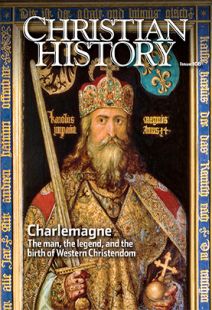The thousand lives of Charlemagne
PASSING CENTURIES only increased Charlemagne’s mythic stature. Of all medieval legends about “Holy Roman Emperors,” over 1,000 were composed about Charlemagne. The next most popular was Frederick I Barbarossa, whose 50 pale in comparison! Perhaps no legend is a greater example of the power of myth than the epic poem La Chanson de Roland (The Song of Roland).
This is ironic, because the event it recounts, the Battle of Roncevaux in 778, was in fact an embarrassing and utter defeat for Charlemagne. Through a secret alliance, Charlemagne had gotten himself embroiled in an Islamic civil war in Islamic Andalusia (modern Spain). But his attempt to invade and conquer portions of Andalusia did not go well, and Roncevaux was the campaign’s final disaster.
When Charlemagne’s armies arrived in Andalusia, a key Islamic ally had turned against them. As they retreated back across the Pyrenees Mountains into France, the rear of the army fell prey to an ambush by a local, most likely Christian, Basque raiding party looking for a quick profit. Charlemagne lost his baggage train (no doubt carrying spoils of war) and Roland, one of his military lords.
Neither Charlemagne’s failed invasion nor the ambush of Roland were particularly glorious. But as time passed the embellished story became the opening scene of a legendary “defeat” of the Islamic rulers of Spain. In this mythical account, the dying Roland sounds his horn, “Olifant,” before being carried to heaven as a martyr.
Come blow your horn
Responding to Roland’s call, Charlemagne assembles an army of hundreds of thousands. In bloody conflict he defeats not only the Basques but—more importantly—Islamic armies. The Chanson ends with a vision of Charlemagne as the acknowledged defender of Christians against Islam.
Oral versions of this story, widely popular, were sung for centuries. As his Norman army rode to conquer England in 1066, William the Conqueror had his musicians sing of Roland and Charlemagne to inspire them. One of the earliest written versions (1150s) runs to over 4,000 lines long.
Over time the stories of Charlemagne’s military feats were translated repeatedly (including into Swedish and Old Norse) and even spawned “spin-offs.” Lesser companions of Roland, love-struck knight Orlando and sword-wielding archbishop Turpin, became central figures in their own legends. New exploits accrued to the legendary leader, including the liberation of Jerusalem and the subjugation of the entire Byzantine Empire.
These legends reflect the societies that created them. Charlemagne’s use of violence in defense of Christendom was glorified to the point of being physically impossible. His enemies, including the Christians of Byzantium, were extreme stereotypes. The stories also show a lack of basic knowledge about Islam, which the authors seem to think involved idol worship (Muslims in fact forbid any representation of God in art).
It is likely that such legends helped to fuel the violence between Christians and Muslims and between eastern and western Christians that marked much of the Middle Ages. Their effects continue to echo into our own day.
By David A. Michelson
[Christian History originally published this article in Christian History Issue #108 in 2014]
Next articles
“Father forgive them”
The persecution of Christians in modern history: staggering numbers, inspiring stories
Christof Sauer and Thomas SchirrmacherStart seeing persecution
How Westerners overlook persecution, what it looks like, and what we can do about it
The editors and Roy StultsTortured for Christ
Richard Wurmbrand stood for Christ behind the Iron Curtain. It cost him 14 years in prison
Merv KnightMarching in the Lord’s Army
A Romanian Orthodox renewal group faced persecution from both church and state
Edwin Woodruff TaitSupport us
Christian History Institute (CHI) is a non-profit Pennsylvania corporation founded in 1982. Your donations support the continuation of this ministry
Donate



